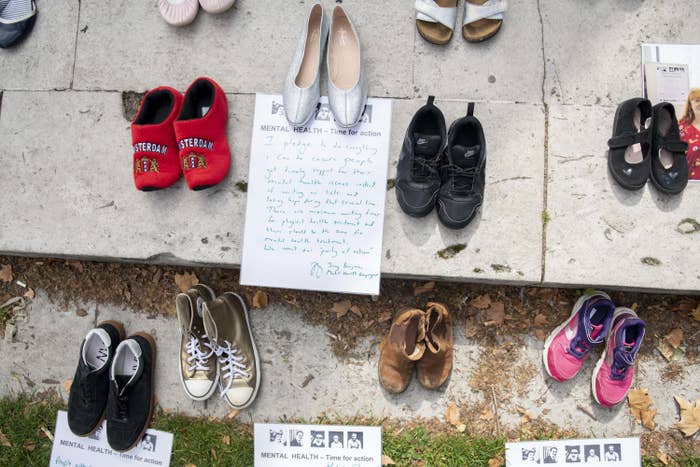
When I was 6 years old, my aunt came to live with us in Carlsbad, California. One morning, as I sat watching The Wizard of Oz, she walked through the house and went into the garage. There, she killed herself.
As a grieving child, I thought being the last person to see my aunt meant, in some way, that her death was my fault. My parents scraped together the money to send me to therapy. Through a combination of mental health care and support from my family, I eventually realized I was not responsible for what happened.
Most important: I also know it was not my aunt’s fault. She needed professional help that she did not receive. She needed reassurance that she was not the only person who ever felt that way. She needed to know there was a way back to hope. But, sadly, mental health is not viewed, or treated, with the same priority as physical health.
Suicide is one of the leading causes of death in the United States, and the number of people exposed to suicide in their lifetime has been estimated to be as high as 40–50% of the population. I am deeply moved by the courageous willingness of so many survivors who share their personal stories of suicidal thoughts or actions. I am inspired by the bravery shown through the painful accounts by family members and friends of the deaths of loved ones — especially given the stigma surrounding suicide and mental health.
As a person who has had a loved one kill herself, I know all too well we have to talk about this crisis — and mental health care, in general — all year long. And so do our political leaders.
I am running for Congress in New York’s 10th District, which is the 35th wealthiest congressional district in the US — as well as the one with the country’s greatest wealth and income inequality. As I meet with voters, I hear from people who work in finance and those on public assistance, from retirees at the end of long professional careers and college students just getting underway with theirs. One concern that connects all of them is the need for a more affordable and accessible system of mental health care.
Almost 70% of respondents in a new Data for Progress study supported a program that would provide adequate mental health treatment for all children in the US’s schools, regardless of income. Sixty-three percent supported requiring a broader set of mental health provisions in insurance plans for those needing mental health or substance abuse services.
Given the wide need, and support, for an affordable mental health care solution, the fact that our government is so slow to make mental health care universally affordable and accessible is unacceptable. It is a crisis at the heart of why I am running for Congress.
For years, I kept my aunt’s suicide a secret. Mental health and mental illness were topics I actively tried to avoid. But five years ago, all that changed after I gave birth to my daughter and experienced postpartum depression. My depression was intense and soul-crushing, yet I resisted reaching out for help. Though I knew 1 in 9 women in the US experience its symptoms, I struggled to acknowledge I was not alone.
Eventually, it was too much to bear on my own. Thanks to work-sponsored health care access and a wonderful therapist, I made it through my postpartum depression with my life intact.
Still, I always remember how lucky I was. What if I did not have insurance? What if I did not have access to a therapist?
Studies paint a devastating picture: CDC statistics show that suicide rates have been climbing in nearly every state over the past two decades, while half the states have seen suicide rates go up more than 30% in that time. Veterans are 21% more likely to kill themselves than the general population is. LGBTQ people face an elevated risk of suicidal thoughts and behaviors. For young girls, the rates of suicide are rising faster than they are for young boys.
For those of us hoping to change the circumstances surrounding an epidemic of suicide in the US, we cannot just talk about suicide prevention during specific weeks, on marked days, or in the wake of tragedies.
Every year, 1 in 5 Americans will experience a mental health disorder. And yet, according to a 2014 study in JAMA Psychiatry, therapists are the least likely of all medical professionals to accept insurance. Only 55% of psychiatrists take insurance, while the average is 89% for other health care providers.
In a place like New York City, therapy can cost $200 to $300 per session. What do we expect people to do if their insurance does not cover these lifesaving services?
The larger crisis is only amplified when it comes to our youth.
The CDC reports that 1 in 5 of American children have a mental, emotional, or behavioral disorder. Within the 10–19 age group, suicide has become a leading cause of death.
We must confront the reality that our health care system continues to fail our children.
As a mother, I want my daughter to grow up in a world where the mental health care that has helped me is readily available for everyone, regardless of their employment or economic status. We cannot just wait for that to magically happen. We need to create a pathway to those solutions.
I believe the answer is a Medicare for All system where health care — including mental health care and addiction services — is a human right, not a privilege.
In the US, everyone should be able to access affordable mental health care. Once that becomes our reality, we will not only change lives, but save them.
The National Suicide Prevention Lifeline is 1-800-273-8255. Other international suicide helplines can be found at befrienders.org.
Lindsey Boylan is a candidate for Congress in New York's 10th District.
